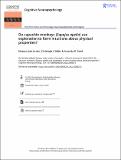Do capuchin monkeys (Sapajus apella) use exploration to form intuitions about physical properties?
Date
22/06/2022Metadata
Show full item recordAbstract
Humans’ flexible innovation relies on our capacity to accurately predict objects’ behaviour. These predictions may originate from a “physics-engine” in the brain which simulates our environment. To explore the evolutionary origins of intuitive physics, we investigate whether capuchin monkeys’ object exploration supports learning. Two capuchin groups experienced exploration sessions involving multiple copies of two objects, one object was easily opened (functional), the other was not (non-functional). We used two within-subject conditions (enrichment-then-test, and test-only) with two object sets per group. Monkeys then underwent individual test sessions where the objects contained rewards, and they choose one to attempt to open. The monkeys spontaneously explored, performing actions which yielded functional information. At test, both groups chose functional objects above chance. While high performance of the test-only group precluded us from establishing learning during exploration, this study reveals the promise of harnessing primates’ natural exploratory tendencies to understand how they see the world.
Citation
Jordan , E , Voelter , C J & Seed , A M 2022 , ' Do capuchin monkeys ( Sapajus apella ) use exploration to form intuitions about physical properties? ' , Cognitive Neuropsychology , vol. Latest Articles . https://doi.org/10.1080/02643294.2022.2088273
Publication
Cognitive Neuropsychology
Status
Peer reviewed
ISSN
0264-3294Type
Journal article
Description
We are grateful to the Royal Zoological Society of Scotland (RZSS) and the University of St Andrews for core financial support to the RZSS Edinburgh Zoo’s Living Links Research Facility where this project was carried out.Collections
Items in the St Andrews Research Repository are protected by copyright, with all rights reserved, unless otherwise indicated.

